Our guest today is always in the “top marketers” lists, one of my favorite writers, and a top expert on content strategy and marketing. She’s also about 40 minutes from me so we could have done this in person. Dang it! We still make it awesome!
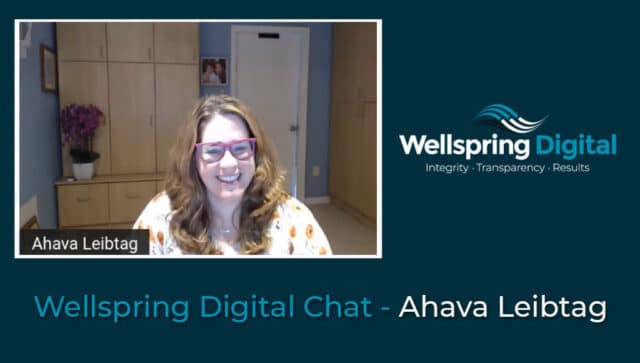
It’s always especially fun for me to talk to content strategists to mainly find out why most content is so awful. Just kidding. We’re only going to talk about the good stuff…
- Overcoming fear of writing
- Google E-A-T, the pandemic, and healthcare content
- To gate or ungate content, that is the question
- Actionable content versus groundbreaking content
- Does the most human company win? Maybe?
Let’s do this!
Digital Transcription (Edited for Readability)
Introductions
Jon-Mikel Bailey: So, I am Jon-Mikel Bailey. I am with Wellspring Digital and this, my friends, is the Wellspring Digital Chat, where we’ve perfected the art of warging. And so what we do is we inhabit the brain through an ancient art of marketing people, marketing experts, we inhabit their brain, we steal all the good stuff. And then we, and then we’re gone. And they don’t know. And everybody’s cool about it. I don’t think we’re breaking any laws.

Ahava Leibtag: What am I left with? Do I still have…
Jon-Mikel Bailey: No, it’s still there. We’re not taking it. It’s kinda like when you Ctrl C, not Ctrl X.
Ahava Leibtag: Okay, I’m good with that. So copy, paste here, copy and paste.
Jon-Mikel Bailey: So yeah, I’ve been watching way too much Game of Thrones. Anyway, our guest today is always in the top marketers lists that I see. She’s one of my favorite writers and a top expert on content, strategy, and marketing. She’s also about 40 minutes from me. So we could have done this in person. But you know, whatever. Digital.
Ahava Leibtag: Nobody drives anywhere anymore.
Jon-Mikel Bailey: Nobody drives, nobody leaves their house. These are dark days. Anyway, please take a moment to introduce yourself to these fine, folks.
Ahava Leibtag: I am Ahava Leibtag. I’m the president of AHA Media Group. We are a content company that produces copywriting, custom copywriting and content marketing for hospitals, healthcare systems, pharmaceutical health startups, med tech, you name it. If it’s healthcare, we do it. And we’re a team of 54 strong, writers, editors, content strategists, and all the people that run us. So yeah, really thrilled to be here. Thank you so much.
Jon-Mikel Bailey: Awesome. Yeah, it’s quite a crew. Yeah. So it’s always especially fun for me to talk to a content strategist to mainly find out and get to the bottom of the issue of why content marketing is also God-awful boring. I’m just kidding. Of course.
Ahava Leibtag: The content conundrum.
Jon-Mikel Bailey: Say that five times fast. Now, we’re only going to talk about the good stuff. So you’re ready.
Ahava Leibtag: I’m ready.
Jon-Mikel Bailey: Let’s jump in. Alright.
Overcoming fear of writing and content
Jon-Mikel Bailey: We’ve been writing and talking about content Mark marketing for years content, marketing, people love to write and talk about content. It’s very meta.
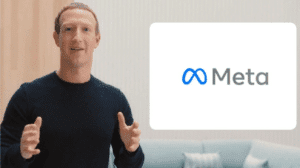
I still get that horrible look, though, from clients. When I talk when I say the word “content” or “writing.” What is it about the written word that scares so many people? And how can they overcome this fear?
Ahava Leibtag: Have you ever sat down to write anything?
Jon-Mikel Bailey: Blank Page?
Ahava Leibtag: Do you remember your fifth-grade writing teacher or your tenth-grade writing teacher or your one on one English comp teacher? So they still have one on one English comp? I don’t even know.
Jon-Mikel Bailey: I blocked all that out. Yeah, well, their years of therapy, and it’s gone.
Ahava Leibtag: So I think for a lot of people, writing is synonymous with conversing in a very awkward way. Because we’re taught to make it passive make it sound a certain way like it belongs in a journal or belongs in a book or it belongs on my English teacher’s desk, when really great writing sounds like a conversation you’re having in your head with the person who’s writing.
So we’re reading somebody’s writing and feeling like “oh, my gosh, they’re talking right to me.” So I think that that’s why people are terrified of writing because they’re being asked to take an already abstract thing, which is talking about your thoughts, and putting them into a very formulaic-sounding experience that they don’t feel comfortable with instead of just writing what you would say.
And so one of the top things that I tell people is just talk into your phone, in a recording device, and send it to a transcription company. And then just copy and paste and sling some words around, find some use the thesaurus for some stronger verbs and, you know, that’s how you’re going to get what you need. Because really, you just got to talk the ideas out usually instead of trying to write them out, because I think that constrains the creativity.
Jon-Mikel Bailey: Do you have to say the word thesaurus because it’s difficult?
Ahava Leibtag: Now, you don’t have to say it. It’s actually a very lovely function in Word or you can go out to dictionary.com. I mean, there are many, many ways. You can actually open a book I will stop you from using up the stores publishing, you know, 1962. And yeah, I think that remembering Say Anything when he opens up for dictionary? That’s a Gen X reference for you listeners.

Jon-Mikel Bailey: That is a that’s a symptom of mental illness when you open someone’s dictionary and there’s that level of highlighting and bookmarking going on.
Ahava Leibtag: So anyway, yes. Yes, I don’t want to go into sales, I won’t have anything to do with sales.
Jon-Mikel Bailey: I don’t want to sell anything.
Ahava Leibtag: I don’t want to buy anything that’s bought or sold.
Jon-Mikel Bailey: We’ve lost anyone outside of the Gen Xers.
Ahava Leibtag: The Gen Xers “oh my god, I’m here for it.” And Millennials are like, What the heck are they? My friends, it’s a classic. Even for you. So I think that yeah, no, you can you don’t have to say the word source. You can just use one or no, I’m fine with that.
Google E-A-T, The Pandemic, and Healthcare Content
Jon-Mikel Bailey: So writing already being a scary subject you’ve now taken writing fear to the next level and specialize in healthcare content. So as if regular content wasn’t daunting enough. But can you talk about the effects of the pandemic on healthcare content? If you think Google E-A-T matters more than ever Google E-A-T is expertise, authoritativeness, and trustworthiness.
Ahava Leibtag: So I think what, so epidemiologists and historians are gonna write about this pandemic for the next 2000 years if the planet makes it that long. We’re living, you know, before we move to Saturn, kids, and we lived on earth. So I think that one of the things that we saw was that the countries that were most productive in lockdowns and rules about Coronavirus and COVID.
And then that, therefore, affected their public health were those that communicated very plainly with the public about it. So Australia and New Zealand, there was, you know, Denmark, Sweden, some of those countries, the Nordic countries, I believe, were able to do that. Now, I couldn’t look at their websites, because I don’t have fluency in their languages.
But I did look at New Zealand and Australia’s health public health websites really carefully. And then I looked at public health websites in the United States, including the CDC, the state of New York, the state of Illinois, the state of California, and I believe DC. And I had looked at the state of Maryland because you know, I was just looking at it for myself. And that’s where I live, my own public consumption.
But what I found was that we did a poor job of communicating clearly. And the number one thing I think we did wrong was that we never had an honest conversation with the American public where we said, “maybe no one’s ever told you this before, but science only can know what it knows up until that moment,” just like everybody else in life.
And so this is an end, they would use terms like this is a “rapidly evolving situation.” I mean, you put the word “evolution” into any sense, and you’ve lost 50% of the population. So I think that we were not smart about from the very beginning saying to people, we’re only going to know what we know, on Tuesday at 5 pm.
And Wednesday, at nine o’clock, we may know more things, we may actually know things that disagree with what we knew on Tuesday at 5 pm. And that’s what this kind of situation is. I think that while that would have been scary for people to hear, I think it would have set expectations.
So what ended up happening was public trust and patience ran out very quickly. So the first thing about writing for healthcare is that you have to build trust with your audience. And so when you come around to the conversation around E-A-T, which is what Google looks for, from trust.
From a robot perspective, and the way that Google runs back, you know, their back end code, I don’t know that he is really something that you can get at from a human cognitive perspective, you can certainly get at it from a ranking and a metric perspective.
But the Kaiser Family Foundation ran a study and found out that the CDC website lost nine points in credibility with the American public.
Jon-Mikel Bailey: Wow.
Ahava Leibtag: So, you know, for Google E-A-T, you know, CDC, I mean, that’s the gold standard. But for people, it stopped being the gold standard. So when you’re writing for health, any kind of health care, you better make sure you know what you’re talking about. You better make sure you have facts, you better make sure you’re backlinking to sources.
But I also think you have to understand that just because you can control what’s coming up in organic search or influencing what comes up in organic search. You can’t necessarily influence the fact that people may not trust you anymore. So it doesn’t really matter. If Google thinks you’re great, nobody’s gonna look at your website because they don’t trust you anymore.
Does E-A-T Matter for Business Content Too?
Jon-Mikel Bailey: Now, do you think that so this is healthcare content? But do you think the average business person still needs to worry about expertise, authoritativeness, and trustworthiness with their content?
Ahava Leibtag: You know, I think it’s a really, I think it depends what you sell, like, are you pencils, then? I mean, I don’t know if you say your lead is sourced from, you know, Minnesota. And actually, I have no idea but it’s sourced from China, and you’re lying about it. I mean, I don’t know. Do I think that you need to think about from an SEO perspective on Google says, the best practices around er 100%?
Do I think there’s an infodemic out there? 100%? Do I think Google is going to get into the business of censoring things? Yes, because they’re already doing it. While I find myself on the socially liberal side of things, I also feel like once big tech gets into censorship, we are walking an extremely fine line, even though in their well-published defense, they are trying to help public health and the public by doing so.
But you know, free speech is a big problem across the world. And I think Americans delude themselves if they don’t think that it’s a problem here as well, because we’re not even though you know, the free market says the government shouldn’t get involved. I think at this point, some legislation is necessary.
Jon-Mikel Bailey: This podcast, by the way, is sponsored by the good people of Minnesota, the lead capital of the world. (my apologies Joplin, Missouri, clearly I didn’t do my research)
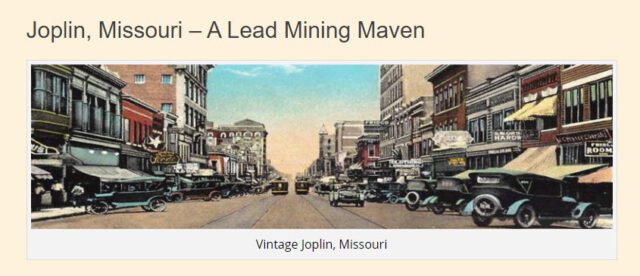
To Gate or To Ungate (Content), That Is The Question
So, during the height of the pandemic, you made the bold decision to ungate your health care content. So in the age of marketing automation, we got to have that email address, right. So can you talk about the effects of your ungating decision – “Ungate-gate” – and share your thoughts on gating content in general?
Ahava Leibtag: So well, the good people of Minnesota sent me an email and said, “you should probably ungate your content because we don’t want people using their pencils writing in their email justice.

So this is what happened, what happened is that I was sitting at this very desk, that plant wasn’t there yet. That’s fake, by the way. And that is, um, I don’t think the good people of Minnesota grow orchids, but you know, who knows, maybe they do, there’s gonna be a lot of work on Minnesota.
State of Minnesota, I’m gonna write my fourth-grade book report on that. So I was sitting here, and I completely felt like totally just devastated and useless. And all the adjectives that describe somebody who didn’t feel like she could control or influence any situation at this point. And clients were telling us these terrible sob stories, and it was just, you know, you just felt like, what am I going to do with my life.
So right away, we created that plain language cheat sheet. Because I said to my staff, if we’re having trouble writing about this, you better believe that all the people that have to write about this for the first time are having trouble writing about it. So we created a plain language cheat sheet on commonly used terms and COVID.
And what they really mean, we won two awards for it. So we’re very, very, very proud of that piece of work. But what happened was, we were looking at our statistics, and it was like, not enough people were downloading, like in the beginning, you know, you get like 500 downloads in a week, you know what I’m saying? Like, it’s, it’s doing well, and then you know, it starts to trickle down and trickle-down, and you’re like, I thought 1000s of people would want this thing because 1000s of people have to write about this.
So I said to my team, let’s just ungate it all. If we truly believe that our mission is to empower people to make the most important decisions of their lives, the only way that’s going to happen is if healthcare communicators feel empowered to communicate clearly. So let’s empower them. And that’s what we did. We engaged it in and our social media following went up and our email subscription list went up.
And I don’t know, it just seemed like it worked for us and our business, we’re getting ready to produce something specifically for our hospital clients. And, you know, I think the conversation is going to come up with my marketing team, like, do you want to get this on like now? Because here’s the thing, here’s the thing about content marketing, if you gate it.
I don’t think this works in a big fortune 500 company, no, no VP of marketing. I don’t care. But the truth of the matter is that the leads who are interested are going to reach out and the leads who aren’t interested are not. And are they going to continue to be nurtured with you? Well, one would hope that after reading a quality piece of content, they’re going to want to follow you and know more about you and learn more about you.
If they’re not are you really missing out on a major nurturing opportunity? I don’t know for my business, I made a decision. I don’t think it’s right the right decision for every business, I don’t believe in best practices for everybody. But I do believe that there might be value in your own organization.
Good listeners who have paused and watched an hour and a half of Say Anything that let us know how I felt about the boombox…
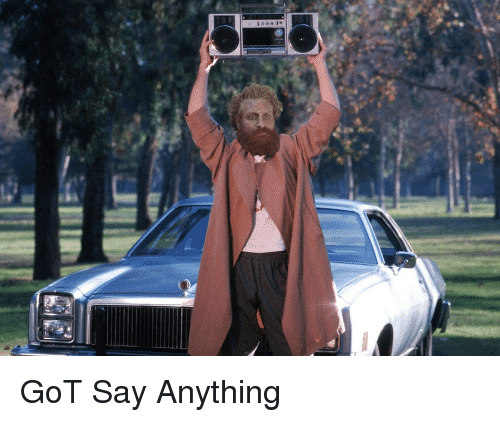
And that there might be a couple of pieces that you want to try ungating and watch what happens. So, you know, just my own experience share.
Is Ungating Content Marketing Always The Best Thing?
Jon-Mikel Bailey: Yeah. I mean, my school of thought tends to be that I want to get the content out there. I truly, you know, this might sound like BS, but I truly, really want to help people with the content that I produce, and that we produce here at Wellspring.
So because I agree, I think, I think the more you become a resource, a trusted resource to clients and potential clients, and even people who are never going to be clients, you’re still, your reputation gets that bump. And whether it’s electronic or in real life, I think I think that matters. Definitely.
Ahava Leibtag: Yeah, I do also. But I do think that there are cases to be made to argue against ungating it. For example, let’s create a custom research report. And you really only want to share that with the share of your market that’s really going to be interested in communicating with you on a regular basis. I could see somebody making that argument. A plain language cheat sheet. I mean, that isn’t created to drive leads. That’s created to help and therefore I don’t think that it should be gated.
Jon-Mikel Bailey: The content gating debate, the gate debate, the gate debate.
Ahava Leibtag: Nobody? Nobody. Nobody’s debated with me about it. Everybody’s been like, “that’s super cool that you did that.” Maybe behind my back, they’re telling me like, you know, how this business? For mine. That’s my face. They’re like, “you go girl.”
Jon-Mikel Bailey: So let’s talk about thought leadership.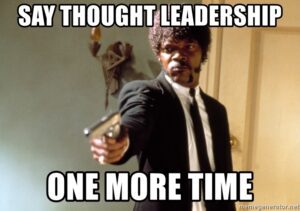 So there’s no sort of shortage of bloggers out there trying to write controversial or groundbreaking stuff. And, you know, in a busy world, is actionable content a better strategy for your businesses than trying to be groundbreaking all the time? Or, you know, is there power in both?
So there’s no sort of shortage of bloggers out there trying to write controversial or groundbreaking stuff. And, you know, in a busy world, is actionable content a better strategy for your businesses than trying to be groundbreaking all the time? Or, you know, is there power in both?
I just want to get you to weigh in on this. I have my opinion.
Ahava Leibtag: Who is groundbreaking right now?
Jon-Mikel Bailey: Well, that’s a good point. There’s a lot of people trying to be groundbreaking.
Ahava Leibtag: They think they’re groundbreaking. Um, the last groundbreaking article that I read was from Mark Schaefer, where he talks about content shock.
Jon-Mikel Bailey: I had a feeling that was gonna be what you were gonna say too.
Ahava Leibtag: Really?
Jon-Mikel Bailey: Totally Yeah.
Ahava Leibtag: Um, what was?
Jon-Mikel Bailey: I mean, really, what I’m asking about is actionable content, you know, is it, at the end of the day, you know, are you going to get more from challenging somebody or from helping them out? I don’t know, I guess that’s a kind of an unfair way to ask the question because I’m sort of leading the witness.
Ahava Leibtag: You’re asking me a legitimate question. And the answer is that I think it depends on what you do and who you’re talking to. So I have friends in my space that are more successful than I am that sell enterprise-level solutions, and they talk to CMOs. That’s their sales technique. CMOs, are now aware of me and want to get to know me better because they are much more aware of their content programs.
And they see that that’s a challenge in their organization. But most of the time, the hiring decisions will come down to the directors of digital or to the marketing managers or to the, you know, managers of those types of teams, because they’re the ones making those sort of decisions. When I create actionable content for practitioners, I’m not selling, I’m building a brand and building an awareness that I’m a value that I have, neither group can be a value to their company, the practitioners aren’t going to hire us because they’re the ones doing the work.
They don’t want an outside consulting firm to come in. Here’s the secret about practitioners, they get promoted. And they, you know, think about who’s going to be able to help me grow my team and grow what I’m doing. So I think that when you’re selling something like I’m selling, which is constant consultative consulting solutions, forget it.
Jon-Mikel Bailey: Sound it out.
Ahava Leibtag: It’s Monday. Okay. Go easy on us here. Thank you. If I’m doing if I’m selling consulting, but I’m also selling tactical, then I have to think about content for every level that I’m selling to not just actionable content. Now there’s actionable content for CMOs also, I mean, I don’t disagree that that exists.
In fact, one of the pieces we’re about to produce is what your CMO needs to know about CRM. So I definitely think that there’s a place for both. But I think, you know, you need to be looking at a mix of types of content. Do I think actionable content is going to get people’s attention more than eyebrow-raising content or controversial content? Probably not. It’s sexier to have a controversy. I’m sorry.
Jon-Mikel Bailey: No, and that’s fair.
Ahava Leibtag: Unpopular opinion.
Jon-Mikel Bailey: No, I agree. I agree. I think it’s fair. I mean, I, you know, absolutely. You know, you’re not going to go viral, you know, Content Shock went viral because Mark challenged the status quo. But it’s what’s also built an entire, you know, sort of marketing system off of that.
Ahava Leibtag: Yeah. So when I ask the question, what’s the last controversial thing you read?
Jon-Mikel Bailey: Oh, man, crap. I should have known you were gonna ask me this.
Ahava Leibtag: Because I can’t that’s the last thing I read that I thought was really controversial.
Jon-Mikel Bailey: Yeah, the only thing that stands out to me is the content shock one, you know, I read a lot of content out there, especially from marketers where they’re trying to be they’re trying to create some sort of the next content shock type article.
Ahava Leibtag: Well, nobody has because what Mark basically said was, what you’re doing is not gonna get you where you want to go. And then we’re gonna do this. And that’s going to get you on where you want to go. And by the way, that’s more content. So I agree with you.
And I love Mark and I think he’s a stand-up person. And I think he has a lot of really great creative ideas. I don’t know that he even knew. I think even if you ask him, he’ll tell you he didn’t realize it was Yeah, you never know when you write that kind of stuff.
What I’ll say is that I will say the last controversial thing I heard was Joe Pulizzi likes to talk about getting into like tilt coins and Bitcoin. This is his new thing. So that was kind of like where I was like what is happening right now. But um, anyway.
Jon-Mikel Bailey: Duane Forrester is big on that too. It’s all these marketing guys are like getting obsessed with bitcoins and NFTs and it’s funny.
Ahava Leibtag: I know good for them. So happy that they have extra income to screw around with. I’m just trying to buy pencils with lead.
Jon-Mikel Bailey: Hear that Minneapolis, Minnesota? Send pencils, lead capital the world, appreciate it. Thank you.
Ahava Leibtag: Maybe they can get target to make a donation. So I am I think that consistency and thoughtfulness is really the answer towards driving a successful business. You know, it does a kick-ass job of this? Ann Handley, (amen). Ann Handley writes this phenomenal newsletter every two weeks. If you don’t have it signed up, go to AnnHandley.com. She spells her name with only two Ns.
Jon-Mikel Bailey: What’s the name of the newsletter? I’m blanking on the name of the newsletter, and it’s awesome.
Ahava Leibtag: Total Annarchy.
Jon-Mikel Bailey: That’s right. That’s right. Okay.
And it’s like, I happen to be besties with and she’s really one of my good friends. I text with her several times a week. And I’m (namedrop). Yeah. But um, she, like when I read it, I just cracked up because she just she says the funniest things. And she really connects with her audience.
She is the exact, you know, when you asked me that thing about don’t be afraid of writing, I was thinking about her and how what she writes, she really spends a lot of time thinking about how she wants to sound in somebody’s head.
And so from my perspective, she’s the type of person who she’s writing about the same things every two weeks, she has a fresh take on them. And the point of the newsletter really was so that people would know that she was available for speaking and to keep people nurtured so that the next time she releases a book, they’ll be excited to buy it.
She grew that list of 40,000 people over two years of incredible growth, like any company in the world would be so thrilled. But her last email newsletters about how she did it, she spends eight hours on a newsletter. Eight, eight hours. And those newsletters maybe are 1000 words long.
If so, when you read about that, it really brings you to an appreciation of what really great writing looks like and what it should sound like and all that kind of good stuff. So I guess for me, I admire that kind of thing way more than I admire a once-in-a-lifetime blog post that went viral. Because it but here we are still talking about it.
So I know but the point is, is that I would rather much have that kind of input and influence on an industry than one blog post that freaked a lot of people out and then didn’t really change anything about what people did.
Jon-Mikel Bailey: Amen, sister. By the way, anyone who does the chicken dance during their keynote speeches, which Ann does, is okay in my book.

Ahava Leibtag: Yeah, totally rules.
Jon-Mikel Bailey: Ann rules. Oh, see what I did there? Ann Rules. Content Rules. Anyway.
In Marketing, Does the Most Human Company Win? Maybe?
So I’m in a recent Content Marketing Institute article, you were quoted as saying that the “post-pandemic is,” and this was challenging someone else’s opinion, “your best chance to enhance your relationships with current customers and show them what they mean to you.”
So I spoke to Shonali Burke and, ding ding ding, Mark Schaefer, about a month or so I spoke to Shonali and Mark, two wonderful people really close to me. Just lovely people and we talk all the time. But anyway, I spoke to them about H2H marketing, human-to-human marketing, as opposed to B2B or B2C. So did the pandemic make us more human? Can our marketing be altruistic? Or have we learned nothing?
Ahava Leibtag: We’ve learned nothing. Oh.
Jon-Mikel Bailey: Sorry, Minnesota. What can I tell you? We screwed the pooch.
Ahava Leibtag: Did you want me to elaborate? I assume.
Jon-Mikel Bailey: It’s up to you.
Ahava Leibtag: Do I want to I just think that first of all, it’s too soon to tell? There’s no way to know that. Um, I think that we’d like to think we became more human to human. But even when I published the engaging article and Drew Davis wrote about it, and Andy wrote back and wrote about it. And there were a lot of challenges to that idea on LinkedIn. I mean, everybody was like, “Go girl.”
But there was a lot of like, “that wouldn’t work for us,” or which I think is totally fair, you know. But I think that we, we’d like to be more human. I think we’ve become more casual in our marketing. The tones have changed, and the sense of humor is different. And I think the sensitivity, you know, what, here’s what I want to say.
I think what really changed is Black Lives Matter. I think the social justice summer that we experienced as a culture actually probably made us more human. Do I think that marketing is really going to overgo an entire overhaul and change that much? No, I don’t think business is business.
I think that executives like numbers that are round and green at the end of the spreadsheet. I think that the political crisis in this country is at a breaking point, I think that we are at a time when we should realize that we’re more connected than ever, and what we do affects another person, we are beyond selfish and rude and, you know, creating big walls between us to have conversations as possible.
So now, I’m not so hopeful. Sorry to say.
Jon-Mikel Bailey: Yeah, and I wonder. I agree. I think we’ve learned nothing. I think there are there are definitely exceptions.
Ahava Leibtag: Here all year people to make you feel good. Yeah, you know, drop in anytime.

Jon-Mikel Bailey: But I see, I personally believe and I think you believe this as well. And this is actually to borrow the tagline from one of Mark’s books is the most human company wins. And I believe that there yes, you can. You can get content, you can monetize stuff, you can make money, but you can also do it by being human. And by having empathy for your customers.
Ahava Leibtag: I don’t think, I think that’s complete bullshit. Name the top 10 companies in the world? Do you really think they’re human? Well, Apple, is he talking about from a marketing perspective, the most human company wins? How could you measure something like that there are literally nine touchpoints that have to happen before consumers are even aware that you’re alive?
Jon-Mikel Bailey: You’re making me sad, but you’re right.
Ahava Leibtag: I don’t mean to make you sad. But I think Mark is talking about an aspirational idea, which is beautiful. And I think that that’s what people like Mark Schaefer do is, they write books, and they tell people, we want you to think and focus on this. And people read those books. And they do that for about two weeks or two months. And then they give up because it’s too hard to push that rock up a hill.
I don’t agree. I mean, I think Mark wants that to be true. And I think he has great cases in his book that prove that it can be true, but I don’t think it’s true. The company that does the best is the company that has executives that are focused on sales and talent. That is what Harvard Business Review would tell you and I’m willing to bet my money on Harvard Business Review.
So no, not the most human company. wins, I’m sorry to sound so cynical because I’m in healthcare, I 100% believe in that. And I think you have to sound that way. But I think when you’re a marketer, and you’re not aware of how a company makes money, and how important that is to accompany, then you are missing the entire thrust of what your job is to do to educate your audiences.
Which is to explain to them, figure out how the company makes money, and figure out a way that you can help them make more money because that’s really your job as a marketer. And I think most marketers are not trained to think that way. And they don’t understand that.
Jon-Mikel Bailey: I agree. And, and don’t misunderstand me, I’m not this living in this fairytale world where I think, you know, empathy is the root of all marketing success. But I do believe that some empathy is required.
Ahava Leibtag: I think, don’t get me wrong, I think. Yeah, I think all the empathy is required, the empathy starts in the marketing department, and then it goes to this department, it gets cut, and then it goes to this. So if you start with none, you’re gonna end up with none. Right? But I definitely think empathy for audiences is important.
But when we’re talking about healthcare, there’s a lot of times where we’re selling a product that people have to buy at a really crappy time in their lives. I just got diagnosed with cancer. Now I have to go learn everything I can about cancer so that I can live. That’s a lot of empathy, that you need a lot of empathy.
And I think the most human hospitals probably win. But to overall say the most human companies when I don’t necessarily think that’s true. Look it Apple, Microsoft, Walmart, Google, do you think these are the most human companies? They’re too big to be human companies. So…
Jon-Mikel Bailey: They’re cyborgs?
Ahava Leibtag: I don’t know if they’re cyborgs, but they’re run by.
Jon-Mikel Bailey: What’s his name? Mark Zuckerberg is a cyborg. I’m convinced of it.
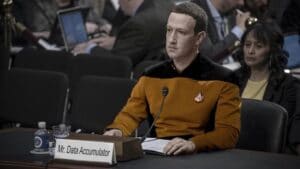
Ahava Leibtag: Do you think he’s sold his soul to the devil?
Jon-Mikel Bailey: I think he sold his soul to a computer system that, you know, Mark six of nine or whatever it’s called on, you know? The Borg.
Ahava Leibtag: You know what really irritates me about Mark Zuckerberg. Mark Zuckerberg has a daughter. He had research on his desk that said Instagram causes self-esteem issues for young girls. And he didn’t do anything about it. Yeah, Mark. Can you call in?
Jon-Mikel Bailey: Yeah, yeah, we call that evil meta. All right. Well, I have a thank you so much. There’s a lot of you.
Ahava Leibtag: For depressing the hell out of you?
Jon-Mikel Bailey: What’s that? Depressing the hell? Thank you for? We talked about Minnesota. We talked about Black Lives Matter.
Ahava Leibtag: Oh wait, I do wanna say one really good thing that I think is important is that, this is something Jay Baer says, I actually think Jay is 100% right about that? I think the pan you know, in Chinese, he doesn’t say this part. I’m just editorializing here. Building on Jay’s point. In Chinese, the same character for chaos is the same character for opportunity.
And I think what the pandemic did was it and the social justice thing, it threw everything up in the air. And I think that it gives people a tremendous amount of opportunity now, hairdressers, manicurists, restaurants, shopping sites online, technology, healthcare, doctors, practitioners, all that stuff, people are willing to move now they’re willing to move where they actually live.
And so I think that there’s a tremendous opportunity for businesses to really get their value proposition, right, to laser-like focus on the clients that are going to bring them the most success, whatever that looks like for that company, whether it’s, you know, a hairdresser loving what she’s doing because she’s helping people look their best. And she only wants to work with little boys who want to have Mohawks, you know what I mean?
Whatever it is, that’s I think, where as a marketer, you should be excited is like, I finally have the chance to really define who we are in the marketplace and go after those people and target them and get them. And that’s where I think there’s a tremendous amount of hope and excitement.
And I hope that that’s what people take away from this lovely interview where we made fun of everything we could think of, but no, I really, I really do because I really do believe honestly, that if we look back and we think we learned anything, it’s that we learned to tighten our focus.
Jon-Mikel Bailey: By the way, every name you’ve dropped in this interview is a past guest.
Ahava Leibtag: Well, that I’ve joined the ranks of the fabulous so there you go. So why am I only on now? It took on gating my content for you to be like, “Oh, maybe she’s a worthwhile ad.”
Jon-Mikel Bailey: See? There’s power.
Ahava Leibtag: The week of Thanksgiving, it’ll be like, three listeners, but those three listeners…
Jon-Mikel Bailey: Sweet. Alright, so hey, I want you, when you’re sitting down, you know, the family’s over for Thanksgiving and you’re writing out you’re your who you’re thankful list with your Minnesota pencil. I want you to think about this interview and how wonderful it was and how you, through this interview, were able to help the audience.
Ahava Leibtag: Those three people, in Minnesota.
Jon-Mikel Bailey: Those three people, in Minnesota.
Ahava Leibtag: You know what? I am so thankful for you listeners, you’re fantastic. I hope you feel like you learned something. I hope you’re inspired to either rewatch or watch say anything by local. Even if you don’t live in Minnesota, please, for your Christmas shopping list patronize a Minnesota local business. They have that cheese. That’s Wisconsin, right?
Jon-Mikel Bailey: Yeah, what does Minnesota have? Cold? They sell boxes of cold.
Ahava Leibtag: They have lakes. Hey, here’s the thing, you can pay
Jon-Mikel Bailey: They have Prince.
Ahava Leibtag: Right? You can patronize Target. It is a local business.
Jon-Mikel Bailey: Oh, that’s just wrong. Thank you so much. Thank you so much. Bye